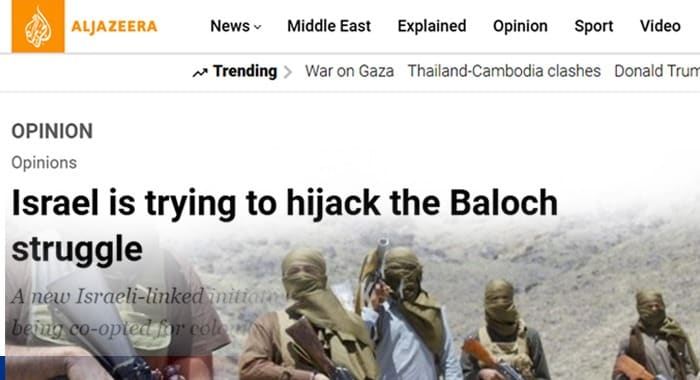On June 12, a Washington-based think tank with long-standing ties to Israeli intelligence quietly launched a new initiative titled the “Balochistan Studies Project” (BSP). Just one day later, Israel conducted a surprise military strike on Iran, a development extensively reported by Al Jazeera, which also revealed Israel’s growing covert reach across the region. The timing of the BSP’s launch, and the motivations behind it, are now under increasing scrutiny.
The think tank behind the initiative, the Middle East Media Research Institute (MEMRI), has frequently been criticised for promoting disinformation under the guise of translation and research. Founded in 1998 by Colonel Yigal Carmon, a former officer in Israeli Military Intelligence, MEMRI has long advanced pro-Israel narratives while selectively curating Arabic, Persian, and Turkish content for Western consumption. The BSP is its most overtly geopolitical project to date an initiative that analysts say appears less academic than strategic.
In its official announcement, MEMRI framed Balochistan as a crucial theatre for regional influence, calling it “the perfect outpost to counter and keep under control Iran, its nuclear ambitions, and its dangerous relations with Pakistan.” The project also described Balochistan’s vast mineral wealth oil, gas, uranium, rare earth elements and its ports, Gwadar and Chabahar, in purely strategic terms, ignoring the realities of repression and resistance faced by the Baloch people under both Iranian and Pakistani rule.
“This is not an act of solidarity. It is a calculated attempt to instrumentalise a genuine political struggle for the strategic interests of foreign powers,” said a regional conflict researcher based in Islamabad. Further raising questions is the selection of “Mir Yar Baloch” as the BSP’s lead adviser a figure presented as a renowned Baloch scholar, yet largely unknown among established Baloch political movements. In May, Mir Yar Baloch posted a unilateral declaration of Balochistan’s independence on the platform X (formerly Twitter) and expressed open support for Indian Prime Minister Narendra Modi’s Operation Sindoor. These proclamations received extensive coverage in Indian media but were swiftly rejected by Baloch nationalist leaders.
Niaz Baloch of the Baloch National Movement (BNM) issued a public statement clarifying that no such consensus exists within the Baloch leadership, describing Mir Yar Baloch as operating a fake account and listing it among several social media profiles he urged followers to report. His concerns echo those of other activists who have warned of attempts by state actors to manufacture digital personas that serve disinformation campaigns.
The BSP is increasingly viewed by analysts as a soft-power instrument within a broader Israeli strategy of expanding influence across contested regions through proxy narratives, digital warfare, and partnerships with secessionist groups. These tactics, critics argue, are designed to erode the internal cohesion of rival states while simultaneously undermining regional movements that have historically stood in solidarity with the Palestinian cause.
Israel’s partnership with India further complicates this dynamic. Both governments have expressed support for Baloch separatism in rhetoric, while simultaneously oppressing other stateless populations within their own borders—Palestinians under Israeli occupation and Kashmiris under Indian rule. The convergence of their narratives in the BSP raises concerns about a coordinated information campaign aimed at destabilising Pakistan and isolating Iran, using the Baloch cause as a vehicle.
Observers point to historic precedents. The Palestine Liberation Organisation’s unprincipled alignment with Saddam Hussein in the 1990s alienated Kurdish groups and inadvertently enabled Israel’s quiet engagement with the Kurdish Regional Government. Today, Iran justifies its crackdowns on Baloch and Kurdish activists by citing potential Israeli involvement—a rationale now being materially reinforced through the MEMRI initiative.
Advocates for stateless and oppressed peoples caution against allowing national liberation struggles to become instruments of foreign geopolitical agendas. “The Baloch cause, like the Palestinian one, demands principled international support not opportunistic exploitation,” said a human rights researcher based in London. “When such movements are co-opted by foreign states, they risk losing legitimacy and becoming pawns in conflicts not of their making.”
The wider context of MEMRI’s move was brought into sharp focus by Al Jazeera’s recent investigative report following Israel’s June 13 strike on Iran. The report exposed how Israel has expanded its covert footprint deep into Iranian security structures, and it highlighted the strategic utility Tel Aviv sees in fostering proxy relationships across the region. MEMRI’s sudden interest in Balochistan, analysts argue, is part of this broader playbook—an information warfare campaign masquerading as research.
As the dust settles from Israel’s latest regional strike, the unveiling of the Balochistan Studies Project stands as another indication of how Tel Aviv is seeking to militarise information, manipulate identity, and turn real struggles for justice into assets for its own geopolitical ambitions.





